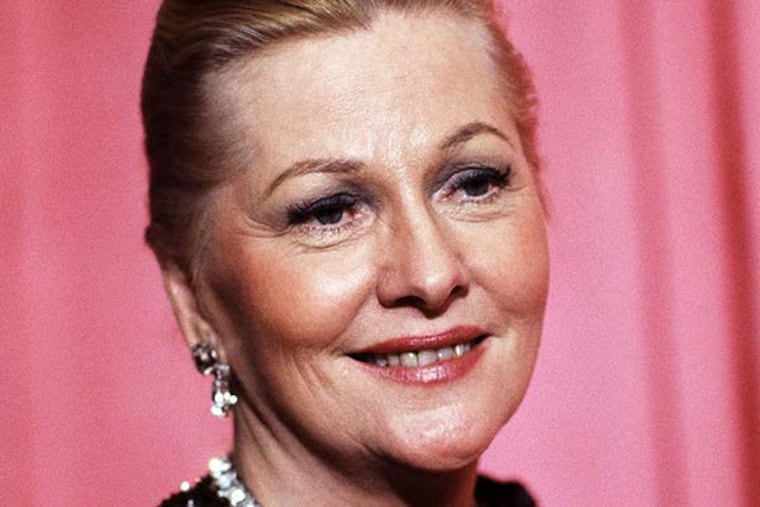Acclaimed actress Joan Fontaine dead at 96
Joan Fontaine, an Academy Award-winning actress whose delicate beauty made her a star in the 1940s and who excelled at portraying romantic vulnerability in such films as Alfred Hitchcock's Suspicion and Rebecca, died Sunday at her home in Carmel, Calif. She was 96.

Joan Fontaine, an Academy Award-winning actress whose delicate beauty made her a star in the 1940s and who excelled at portraying romantic vulnerability in such films as Alfred Hitchcock's Suspicion and Rebecca, died Sunday at her home in Carmel, Calif. She was 96.
Miss Fontaine was the younger sister of Oscar-winning actress Olivia de Havilland, with whom she endured one of the longest-running sibling feuds on record, a rivalry that began in childhood and was encouraged by their ambitious stage mother.
The rupture deepened over the decades, with spats over movie roles and the attention of powerful men such as oil magnate and film producer Howard Hughes.
Miss Fontaine, a teenager when she began her Hollywood career in 1935, was best remembered for playing elegant Englishwomen, fragile society ladies, and wide-eyed innocents dominated by men. She could play chic and she could play demure.
In 1941 she earned her only Oscar opposite Cary Grant in Suspicion, as a meek, rich bride uncertain whether her bridegroom is a murderer. That same year, de Havilland also was nominated, for her leading role in Hold Back the Dawn. In her memoir, No Bed of Roses, Miss Fontaine described the moment when it was announced she had won.
"I froze," she wrote. "I stared across the table, where Olivia was sitting. 'Get up there!' she whispered commandingly. Now what had I done? All the animus we'd felt towards each other as children, the savage wrestling matches, the time Olivia fractured my collarbone, all came rushing back in kaleidoscopic imagery."
Five years later, when de Havilland won the first of her two best-actress Oscar for To Each His Own, she rebuffed her sister's congratulations. Years passed before they spoke again, and the estrangement became permanent after their mother's death in 1975. Not invited to the service, Miss Fontaine said she threatened to tell the press unless she and her family were permitted to attend. The sisters had to be separated by an entire room during a 1979 Oscar winners' reunion. A year earlier, she had said, "I married first, won the Oscar before Olivia did, and if I die first, she'll undoubtedly be livid because I beat her to it!"
Joan de Beauvoir de Havilland was born in Tokyo to English parents on Oct. 22, 1917. They divorced when the girls were toddlers; their mother took them to California and remarried. Joan took her stepfather's name after launching her acting career in 1934 - by then, Olivia was using the de Havilland name.
Unlike her sister - who starred in the hits Captain Blood (1935), The Adventures of Robin Hood (1938) and Gone With the Wind (1939) - Miss Fontaine was slow to to break out of low-budget films. Her first significant notices came in 1939 for The Women, the catty MGM comedy by Clare Boothe Luce, with a cast including Joan Crawford, Norma Shearer, and Rosalind Russell. Holding her own earned her a contract with David O. Selznick, who was to produce Rebecca.
When she read Daphne du Maurier's novel about the insecure wife of a brooding widower, she strongly identified with the part of "the second Mrs. de Winter." It earned earned her 1940 Oscar nomination and praise for her complex performance. She followed with some of her finest work: Suspicion; The Constant Nymph (1943); and Jane Eyre (1943).
Ultimately she appeared in more than 30 movies, including Gunga Din, Max Ophuls' Letter from an Unknown Woman, and films directed by Billy Wilder (The Emperor Waltz), Fritz Lang (Beyond a Reasonable Doubt) and, wised up and dangerous, in Nicholas Ray's Born to be Bad. She starred on Broadway in 1954 in Tea and Sympathy and in 1980 received an Emmy nomination for her cameo on the daytime soap Ryan's Hope.
Her marriages to actor Brian Aherne, producers William Dozier and Collier Young, and Sports Illustrated golf editor Alfred Wright Jr. ended in divorce. She and Dozier had a daughter, and she later adopted a child from Peru.
Miss Fontaine was the niece of British airplane manufacturing pioneer Sir Geoffrey de Havilland and was a skillful pilot and prize-winning balloonist in her own right. She also was reportedly a Cordon Bleu chef, a licensed interior decorator, and an excellent tuna fisherman.